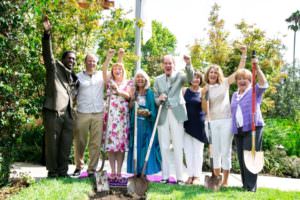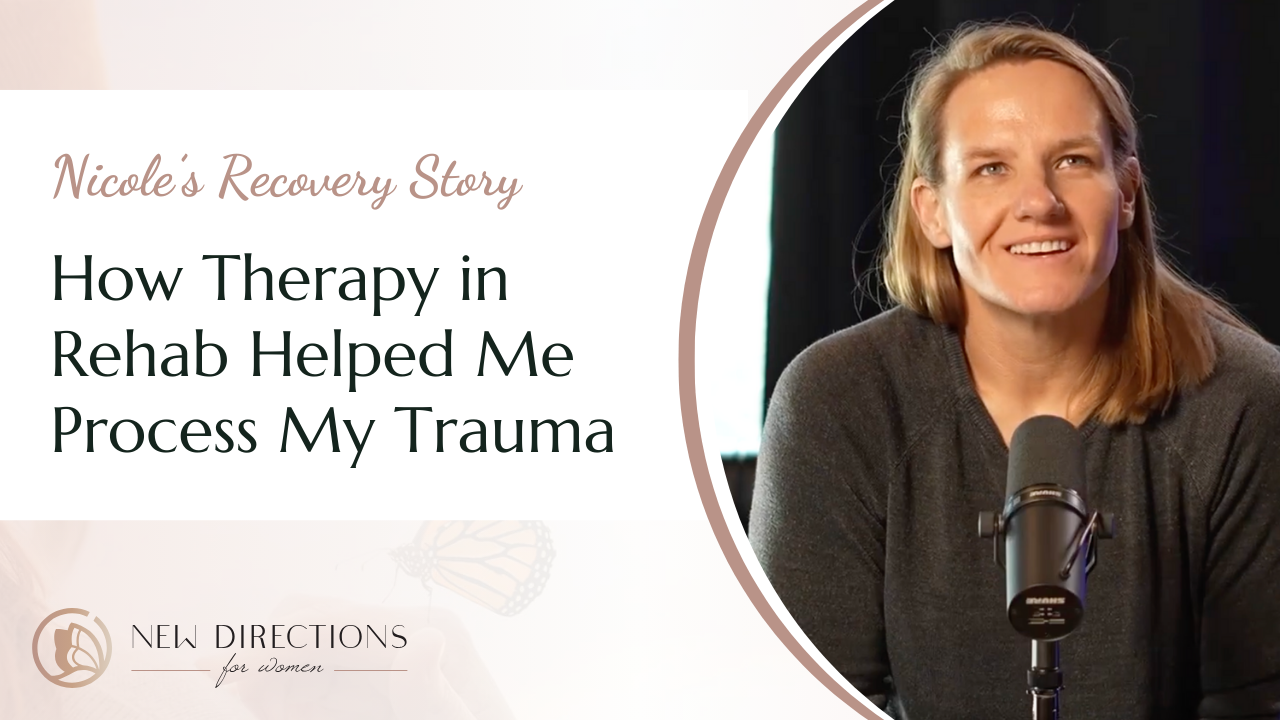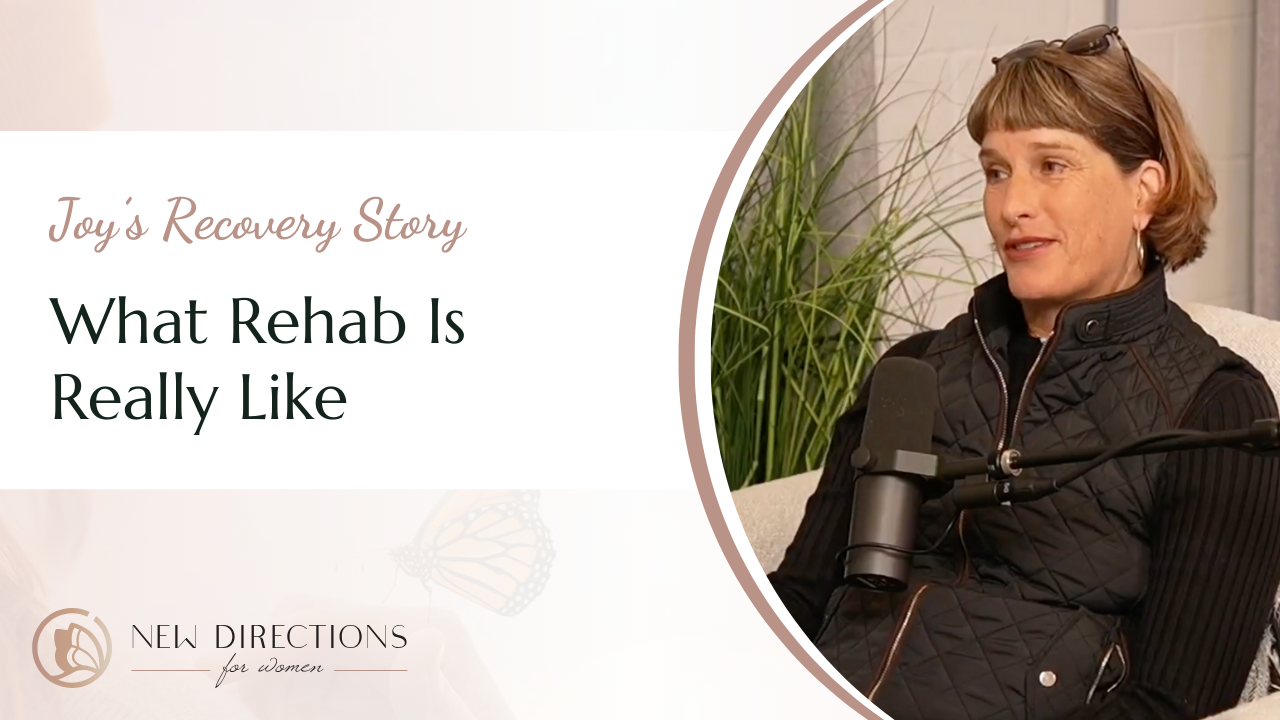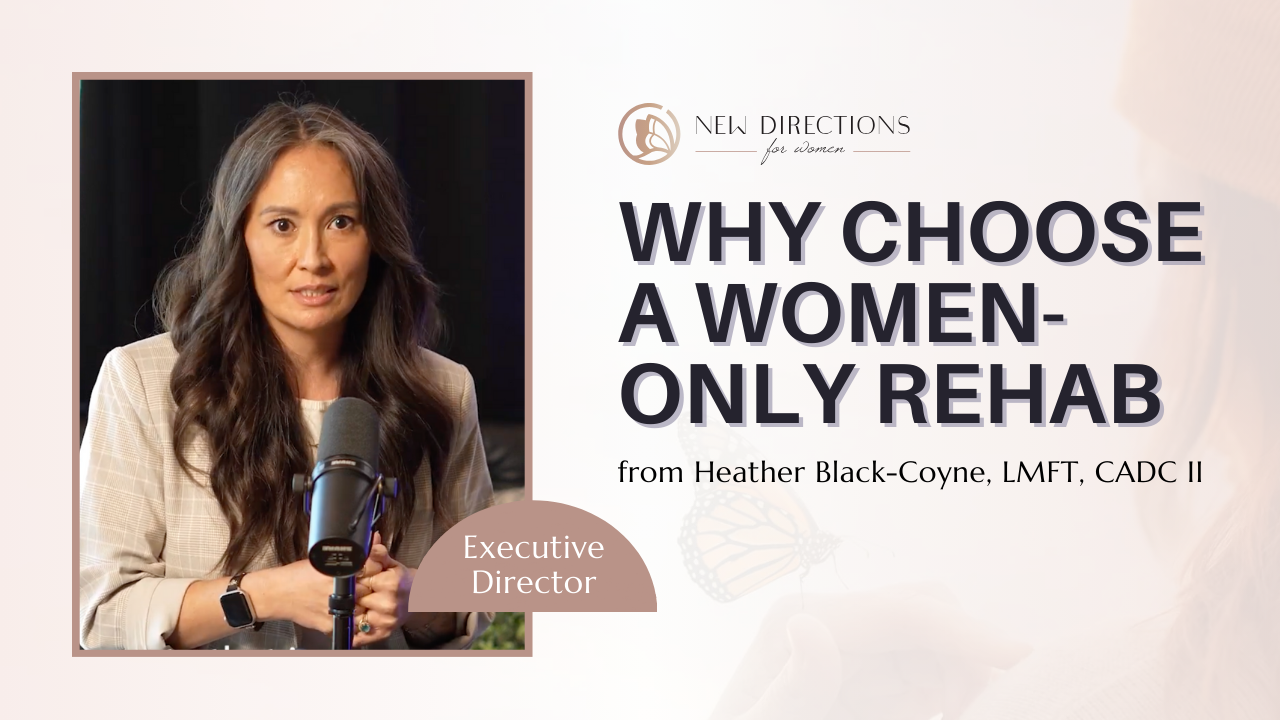 In 2016, Neil Scott, the producer and host of RECOVERY – Coast to Coast visited our beautiful campus and interviewed some of our team members along with care partners and alumnae. His radio show is a two hour nightly national radio talk show dealing exclusively with addiction, with a focus on recovery. In addition, he has been a keynote speaker at numerous national, state and local events and has lectured at America’s leading schools of alcohol and drug studies, including Rutgers University. We are grateful we had the opportunity to get to know him and share all the wonderful life-changing work that we are doing at New Directions for Women. In this segment, he is interviewing, Lyn Wilder, Husband of one of our founders at New Directions.
In 2016, Neil Scott, the producer and host of RECOVERY – Coast to Coast visited our beautiful campus and interviewed some of our team members along with care partners and alumnae. His radio show is a two hour nightly national radio talk show dealing exclusively with addiction, with a focus on recovery. In addition, he has been a keynote speaker at numerous national, state and local events and has lectured at America’s leading schools of alcohol and drug studies, including Rutgers University. We are grateful we had the opportunity to get to know him and share all the wonderful life-changing work that we are doing at New Directions for Women. In this segment, he is interviewing, Lyn Wilder, Husband of one of our founders at New Directions.
Neil Scott:
I am so delighted in this segment to have Lyn Wilder, who was Pamela’s husband for many, many years, and went through the early beginnings of this wonderful program, New Directions for Women. Lyn is joining us tonight to share a little bit about what it was like back in those days, back in the 1970s, in starting a program. Lyn, welcome to the program. Back in the ’70s, treatment was really in its infancy, let alone women’s treatment. Talk about the beginnings and Pamela’s working that arrangement out with the Junior League.
Lyn Wilder:
Thank you. It’s a privilege to be on your show. Pam was an incredible lady. She and I met in recovery in 1966. We were to marry about three years after that. We both were very, very active in recovery.
Neil Scott:
You’re a newcomer. You’ve got, what, 51 years?
Lyn Wilder:
I just celebrated 51 years in recovery.
Neil Scott:
That’s great.
Lyn Wilder:
It’s happened very quickly. I look back and it’s been wonderful. It’s the most incredible life. The recovery life is the most incredible thing that’s ever happened to me.
Neil Scott:
With recovery anything is possible.
Lyn Wilder:
You got it. That’s so, so true. I tell all my new friends that are relatively new. I tell them one thing. Your life is going to change. It does change. Life is in session. A lot of us are involved in 12 steps and 12 traditions and different programs and in recovery. I always tell our new friends or if I’m doing workshops or anything, I say focus on the first half of the first step. That is that we are powerless over alcohol and whatever else you’re putting in your body. You’ve got to get that to go forward with life because the next 11-1/2 steps are about life. The recovery programs, in my opinion, are not about not drinking or using but they’re about living. It’s a living program.
Neil: Absolutely. I did a telethon with Dick Van Dyke back in 1976 in Santa Barbara.
Lyn Wilder:
I happen to know him extremely well.
Neil: He’s a great guy.
Lyn Wilder:
Yes. He is.
Neil: He just turned 90.
Lyn Wilder:
Yes. I know.
Neil: The theme that I used for that telethon, Lyn – and if you’re just joining us, Lyn Wilder is with us in this segment. The theme I used was the bright side of alcoholism is recovery. When people think of alcoholics, they think of drug addicts, they think of the still sick and suffering. They think of the guy on skid row or they think of the family member or they think of the person who is struggling. They don’t realize that once you work your way into a program of recovery that the world opens up and the doors fly wide open. You can do things you never imagined before. That’s exactly what happened back in 1977 when Pam busted down the doors and not only started a treatment program but a treatment program just for women.
Lyn Wilder:
When we moved to Laguna Beach, we moved from West Los Angeles. She’d been involved in the Junior League there as a board member. We moved to Laguna Beach. She got involved with the Junior League here. It was much smaller and everything. Marion Schoen had the dream. She always had the dream. I want a recovery facility for women. Pam started to talk to the Junior League. They said no. That would be too large for us. Then she stood before the whole body of women and said I’m Pam and I’m an alcoholic woman. You could have heard a pin drop. From there things started to happen.
A wonderful man, a retired general named Tom Riley, who was our supervisor, got heavily involved. They started going door to door. Finally, the Junior League said okay and started going door to door very close to where we’re seated right now and was able to purchase from the county three houses. That’s how it started. It started very small. It’s grown into what is absolutely fantastic today.
Neil: What do you think of when you see this campus today?
Lyn Wilder:
We had just had our annual fundraising breakfast for the Pamela Wilder Scholarship Fund. Last year we raised, it’s a matching fund, we raised $690,000. That’s for women who can’t afford it. That was all used. I don’t have the numbers this year but it’s going to be close to that. We just had that within the last week. I think about, and you mentioned that over 5,000 women have come through here since 1977, which is incredible. Since 2001, 600 pregnant women have come through here.
Neil: And 100 babies born.
Lyn Wilder:
One hundred babies have been born on this campus. That’s incredible. You won’t find recovery houses very frequently where babies are born and they take pregnant women. Becky has brought that in. She’s done just a wonderful job as our executive director. It’s wonderful to see that. At the breakfast this year and every year, we had a couple of these young ladies talk. We had one of the young ladies talk that was here as one of the adult children on campus. To hear her story is just incredible.
It makes me remember. Pamela is the one. I just happened to be supporting her. I did what I could do. She brought Muriel Zink in and also fulfilling Marion’s dream. I just watch what the women and what the people around for the last few decades have done to bring this program where it is today, which is one of the most recognizable programs for women in the country. Women come from all over.
I had the great privilege, my wife and I, not Pam. Pam passed away in 1985. My wife and I were in Florida about a month ago. We were visiting friends on both coasts and participating in recovery. A man said he was chairman of the board of a women’s recovery house. I was taken through that house. It’s similar. It’s not New Directions for Women but it was a real joy to go through it and to see the women there. It was found in 1974 in Delray Beach by Susan B. Anthony’s great niece.
To see what’s going on with women in recovery today and, as you mentioned, recovery is changing. What’s going on in the addiction world today is unbelievable. It’s not like it was 50-51 years ago when I came in. There are so many opiates. There are so many street drugs. There are so many different addictions going on today. It’s frightening really.
I have to tell you this because I’m very familiar with what’s going on with our general service office or the general service office in New York. We’ve got as many women almost coming through the doors of Alcoholics Anonymous today and other recovery programs as there are men. That tells you a lot. So, particularly, when you look at this, when you look at New Directions for Women and you see the mothers that are getting clean and sober and you see the babies born. A lot of people raise the question are they born addicted? They’ve got measures now to change that. It gives them a sober mother and the children are sober. It just saves lives.
What we’ve all got that are in the recovery field, it’s a family illness and a family recovery. What’s being done for women today, I can remember years ago, when a woman had some type of addiction or, particularly, if she was an alcoholic or something, they were looked down on.
Neil: It was a double stigma.
Lyn Wilder:
Yes. It was a double stigma. You and I talked about that with Marty Mann. It was a double stigma but that’s changed, thank God, because of the education and the openness today. That’s why we have so many women, and thank God we do, that are coming through the doors in recovery to all types of programs.
Neil: Lyn Wilder is joining us tonight on Recovery Coast to Coast. He has been in long term recovery for 51 years. He was married to Pamela Wilder, who was the leading mover and shaker with the Junior League to get this program off the ground in 1977. It has gone from 1977 to current day serving well over 5,000 women who have found their way into recovery. It’s just an amazing story.
Pamela passed away back in 1985 but there’s the Pamela Wilder Scholarship Fund. Her legacy now is of continuing that recovery for other women, women who cannot afford treatment. Treatment is not cheap. It really isn’t but it’s necessary. There are so many women out there who are in such desperate need of treatment. Yet, the doors are closed. We’ve got to find ways to get those women the help that they need. Why do you think it’s important to be gender specific, Lyn?
Lyn Wilder:
It’s important to be gender specific because of the female gender, how that has opened up so much. As I said, there is many coming through recovery facilities and coming into recovery today. Almost there are as many women as there are men. When I started recovery, I would say it was ten to one. So, thank God that has changed. It’s no longer a stigma for a woman alcoholic, a woman addict. It’s no longer a stigma. Thank God.
Neil: Tell me about some of your memories and some of the highlights of the 40 years of New Directions for Women. What are the things that you reflect on in gratitude?
Lyn Wilder:
Initially, and it still is primarily, its private donors. We had a lot of friends, Pam and I did, that stepped up, particularly women that stepped up and supported Pam in all areas of recovery. We had a lot of ladies that were not in recovery and didn’t have the problem. They stepped up because they could see a need in the community. As it has advanced and to watch what has happened today is absolutely wonderful through the years. Some of our board members have had a major, major impact on going forward.
Becky has been just absolutely wonderful. She was found by a very dear friend of Pam’s and mine, two of them as a matter of fact, on the East Coast at the Seabrook. She came to California. She’s been here about 12 years. What she’s done for this facility, not only locally but throughout the country, has just been wonderful.
Neil: Internationally as well.
Lyn Wilder:
Yeah.
Neil: I often say in this field there is no such thing as coincidence. There’s God-incidence.
Lyn Wilder:
You’ve got it. I’ve watched the purchase of additional houses. We had just the Founders House, which was originally dedicated in 1984. It has just been refurbished totally. In February of this year the ribbon was cut for that. We’re about to go to our third phase where we’re going to build a larger facility on this campus for women. Hopefully, within the next year and a half, we’ll have 48 beds for recovery, to see that and to go forward. But you have to have good people and you have to have a wonderful, wonderful staff, which New Directions has.
Neil: That is really the difference. People ask me all the time how do you find a good treatment center? You look on the internet and there are a million of them. Some of them are just out to make money. They treat and release. They’re more concerned about filling the next bed than following someone after they leave treatment. One of the things I would say was, don’t judge it by the brick and mortar. Take a look at the staff. How long has the staff been together? What is the staff commitment? It’s the staff that makes the engine run in a treatment program. You find a good staff that’s been around a long time, much like New Directions for Women, you’ve found yourself a good place for treatment.
Lyn Wilder:
Absolutely, and the outside support you have around New Directions for Women is just incredible.
Neil: It’s phenomenal down here, the neighbors, the corporate community. It just goes on and on and on. You have certainly seen a lot since the very beginning. You shared something with me off the air. I’d like you to share it with our listeners. It was an opportunity you had to meet with Lois Wilson. You had asked Lois Wilson what you needed to know. If you could tell that story.
Lyn Wilder:
I’d be happy to. Lois was the co-founder of Al-Anon and the wife of the co-founder Bill Wilson of Alcoholics Anonymous. I had the great privilege of meeting her in Arkansas in the early ’70s and then again in Dallas-Fort Worth where we both had participated in a conference. I got to the airport and I was on the same plane with her. She was going to New York which was home. It was a Sunday night. I was going to New York on business. I sat with her. I just asked her the question. I said, Lois, what do you think the most important thing is we have to remember? I’ve never forgotten this. She said, Lyn, the willingness to let go, the willingness to let go. That’s very easy to say but it’s so true and difficult to do sometimes.
Neil: It’s very difficult to do. Just like Alcoholics Anonymous is a simple program but it’s not often easy. It’s a tough road. But the joys and reality of recovery are just beyond comprehension. To see these women come in here frightened and scared and with a lot of trepidation and then fast forward to 30, 60, or 90 days, they don’t want to leave. They have found a home. They have found a new family. They have found the winners. They have found the community that will carry them forward.
Lyn Wilder:
The board right now is looking at and working on and we will have, and I’m not on the board but I can assure you, we will have aftercare sober living homes where women can move in and they can continue with their lives. They can get jobs in the community. They can go forward.
Neil: You don’t get well in treatment. You don’t get cured. It is a beginning. It is a basic foundation from which you grow. It is a process. A lot of people have the misconception that when you go through a treatment program, you get out in 30 days and you’re well. You’re better in 30 days but it’s just the basic beginning. You still have a road to travel. You do that one day at a time.
Lyn Wilder:
Thank God for all of the people in the beginning, for our co-founders and Alcoholics Anonymous and Al-Anon as well. As I look over your shoulders and we’re talking, I see Bill and Lois, a picture of them. If you know the beginnings of what they went through, they struggled and they struggled. They lived on different people’s couches for a long, long time. Things really didn’t come into focus until about 1939. They started slowly. One article was written in the Liberty magazine. They had 5,000 of the big books in a warehouse. Nobody was ordering them. The Reader’s Digest, I should have said, was the first one and then the Liberty magazine about six months later. People started to move. Then Jack Alexander wrote the article in 1941 in the Saturday Evening Post and things started to really take off.
Neil: I remember that.
Lynn: From an economic standpoint, financially, it took off for Lois and Bill or Dr. Bob and his wife in Akron because he was pouring everything back into the recovery program in Akron. They had a hard time. All the people that really developed the foundation for us thank God for them. Recovery is slow. It takes time. The two greatest healers in my opinion are love and time. My mantra is love and service. That’s what we do.
Neil: Lyn Wilder joining us tonight on Recovery Coast to Coast. It has been a delight for me, a guilty pleasure. Thank you so much for stopping by and sharing a little bit about not only New Directions for Women, about the early beginnings, and the last 51 years that you’ve seen, you’ve been an integral part of, one day at a time. I say you’re in recovery 51 years but if you get up this morning and you’re clean and sober, that’s all we’re talking about is today.
Lyn Wilder:
You got it and thank you so much for what you’re doing. It’s wonderful and just keeps doing it.
Neil: Life will continue to be in session.
Lyn Wilder:
Yes. It will.
Neil: Lyn Wilder, I always say the bright side of addiction is recovery and he certainly embodies that.



